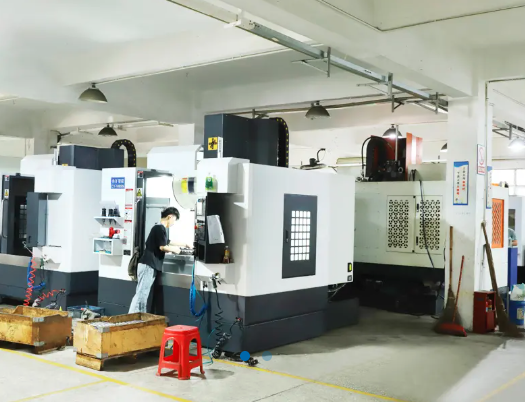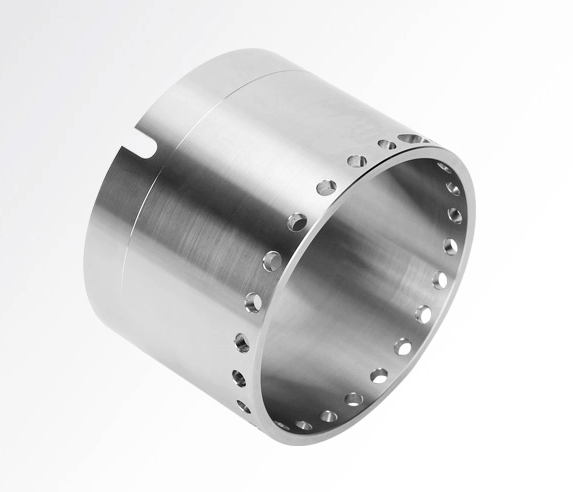


Benefits of CNC machining for modern manufacturing in 2025
Views: 0 Author: Site Editor Publish Time: 2025-09-12 Origin: Site









CNC machining, or Computer Numerical Control machining, has become a cornerstone for modern manufacturing. It allows manufacturers to automate precision tasks, reduce errors, and produce high-quality parts faster. Desktop CNC machines bring these capabilities to small workshops and prototyping labs, making complex machining more accessible than ever. In 2025, manufacturers face high demands for speed, accuracy, and customization, and CNC machining answers all three.
Key benefits include:
Automates repetitive tasks for consistent quality
Creates intricate and complex geometries
Reduces material waste and human error
Speeds up prototyping and small-batch production
Precision and Accuracy in Modern Manufacturing
Precision is a cornerstone of modern manufacturing, particularly in industries where safety, reliability, and performance are paramount, such as aerospace, automotive, and medical devices. The advent of Computer Numerical Control (CNC) technology has revolutionized these sectors by enabling manufacturers to achieve levels of precision that were previously unattainable with manual machining techniques.
CNC Turning and Milling: The Precision Powerhouses
CNC Turning and CNC Milling are two of the most widely used CNC processes. These technologies allow manufacturers to produce components with extremely tight tolerances, ensuring that every part meets exact specifications. This level of precision is crucial in industries where the failure of a single component can have catastrophic consequences.
| Feature | Manual Machining | CNC Machining |
|---|---|---|
| Tolerance | ±0.5 mm | ±0.01 mm |
| Repeatability | Low | High |
| Complexity | Limited | High |
Desktop CNC Machines: Precision at Scale
The rise of Desktop CNC machines has democratized precision manufacturing. These compact machines bring the same level of precision to smaller-scale operations, making it possible for small and medium-sized enterprises (SMEs) and even individual engineers to produce highly precise components. This versatility and efficiency are transforming modern manufacturing by enabling rapid prototyping and small-scale production runs without compromising on quality.
Real-World Applications
In the aerospace industry, CNC machining is used to produce critical components such as turbine blades and aircraft structural parts. The precision of CNC machines ensures that these components can withstand the extreme conditions of flight. In the automotive sector, CNC machining is essential for producing engine parts, transmission components, and body panels. The high precision and repeatability of CNC machines ensure that these parts fit together perfectly, enhancing performance and safety.
In the medical device industry, CNC machining is used to produce implants, surgical instruments, and diagnostic equipment. The ability to achieve tight tolerances and high repeatability is critical for ensuring the safety and effectiveness of these devices.
Speed and Efficiency – Meeting Production Demands
CNC machining is not only about precision; it is also about speed and efficiency. The ability to produce components quickly and consistently is essential for meeting the demands of modern manufacturing.
High-Speed Production
CNC machines can operate at much higher speeds than manual machines, significantly reducing production time. Desktop CNC machines enable engineers to quickly prototype new designs, while full-scale CNC mills and turning centers handle mass production with remarkable speed.
Multi-Axis Machines: The Efficiency Boost
Multi-axis CNC machines are particularly efficient because they can perform multiple operations in a single setup. These machines can cut, drill, and mill simultaneously, eliminating the need for additional handling and setup time. This capability is especially valuable in complex manufacturing processes where multiple operations are required to produce a single component.
Integration with Industry 4.0
The integration of CNC machines with Industry 4.0 systems further enhances efficiency. These systems allow for real-time production tracking, predictive maintenance, and quality control. By leveraging data analytics and automation, manufacturers can optimize their production processes, reduce downtime, and ensure consistent quality.
Key Efficiency Advantages
High-speed milling and turning: CNC machines can operate at much higher speeds than manual machines, significantly reducing production time.
Simultaneous multi-axis operations: Multi-axis machines can perform multiple operations in a single setup, eliminating the need for additional handling and setup time.
Integration with Industry 4.0 systems: Real-time production tracking, predictive maintenance, and quality control ensure consistent quality and reduced downtime.
Faster iteration for product development: Engineers can quickly test and refine designs, reducing the time and cost associated with product development.
Flexibility and Customization in Modern Manufacturing
In today’s competitive market, flexibility and customization are essential. Modern consumers and industries demand tailored products that meet their specific needs. CNC machining excels in this area by enabling precise customization, whether for one-off prototypes or small production runs.
Tailored Products
CNC machining allows manufacturers to produce highly customized products with ease. Examples include:
Personalized medical implants: Custom implants that fit the patient’s anatomy perfectly, enhancing surgical outcomes and patient recovery.
Lightweight automotive components: Customized parts that reduce vehicle weight, improve fuel efficiency, and enhance performance.
Custom electronics housings: Tailored enclosures that fit specific electronic components, ensuring optimal performance and aesthetics.
Workflow: From Design to Final Product
The CNC machining workflow is highly flexible and efficient. It typically involves the following steps:
CAD Design: Engineers create detailed 3D models of the desired component using Computer-Aided Design (CAD) software.
CAM Programming: The CAD model is then converted into machine-readable instructions using Computer-Aided Manufacturing (CAM) software. This step involves specifying the tool paths, cutting speeds, and other parameters.
CNC Machine Output: The CNC machine follows the programmed instructions to produce the final part with high precision and repeatability.
Final Part: The finished component is inspected and tested to ensure it meets the required specifications.
Digital Prototyping and Cost Savings
One of the key advantages of CNC machining is the ability to test and adjust designs digitally before cutting materials. This digital prototyping process saves time and cost by allowing engineers to identify and correct design flaws before production begins. It also enables rapid iteration, allowing manufacturers to quickly respond to market demands and customer feedback.

Cost Reduction and Sustainability
Automation reduces labor costs, while precise CNC operations minimize material waste. Advanced CNC methods, including Laser Cutting and Waterjet Cutting, further optimize resource use. Manufacturers can also experiment with sustainable materials like biodegradable polymers or advanced composites.
Key points:
Lower labor requirements through automation
Reduced scrap and rework
Energy-efficient machining cycles
Environmentally-friendly material options
These cost and sustainability advantages are critical as modern manufacturing prioritizes efficiency and eco-responsibility.
Integration with Modern Technologies
CNC machining is increasingly intertwined with modern technologies.
VR/AR supports safe training and 3D design visualization
IoT enables remote machine monitoring and predictive maintenance
AI and data analytics optimize machine performance in real-time
Connected, smart factories allow CNC machines to communicate across production lines, reducing downtime and improving output consistency. Desktop CNC machines also benefit from these integrations, offering smaller manufacturers access to smarter manufacturing tools.
Applications Across Industries
CNC machining impacts a wide range of sectors:
Aerospace: Titanium and carbon fiber components for lightweight, durable structures
Automotive: High-precision EV parts and lightweight alloys for better efficiency
Medical Devices: Customized implants, surgical tools, and dental components
Electronics: Tiny, intricate housings and heat sinks
Future Outlook for CNC in Modern Manufacturing
The future of CNC machining is driven by automation, robotics, and hybrid manufacturing methods. Desktop CNC machines are becoming more capable, supporting localized, agile production. Key trends include:
Integration of advanced materials: ceramics, composites, and new alloys
Increased automation to reduce human error
Smart factories with AI and real-time analytics
Reshoring production to improve responsiveness
These innovations make CNC machining a strategic tool for manufacturers aiming to stay competitive in 2025 and beyond.
Choosing the Right CNC Solution for Modern Manufacturing
When selecting a CNC machine, consider:
Machine type: desktop CNC machine, CNC Turning, CNC Milling
Material capabilities: metals, plastics, composites
Software compatibility: CAD/CAM integration for precision and efficiency
Production goals: high-volume vs. small-batch runs
Balancing precision, speed, cost, and customization ensures that CNC machinery maximizes productivity for modern manufacturing needs.

Frequently Asked Questions
1. What is CNC machining and why is it important for modern manufacturing?
CNC machining, or Computer Numerical Control machining, automates cutting, milling, and turning processes with high precision. It reduces errors, increases speed, and allows manufacturers to produce complex parts consistently, making it essential for modern manufacturing in 2025.
2. How do desktop CNC machines benefit small workshops and prototyping?
Desktop CNC machines bring industrial-grade precision to small-scale operations. They allow rapid prototyping, design testing, and small-batch production without the high cost of full-size CNC mills or lathes.
3. How does CNC machining improve efficiency in manufacturing?
It reduces manual labor, speeds up production cycles, minimizes material waste, and allows multi-axis operations in a single setup. Integration with IoT and Industry 4.0 technologies further optimizes workflow.
4. How is CNC machining contributing to sustainability?
CNC machining reduces scrap material, enables energy-efficient production, and supports the use of recyclable or biodegradable materials. These factors help manufacturers lower their environmental impact.
Conclusion
CNC machining offers unmatched precision, efficiency, and flexibility. Desktop CNC machines bring these advantages to small-scale operations, while full-scale CNC Turning and CNC Milling machines support industrial-scale production. For modern manufacturing in 2025, CNC is not just a tool—it’s the backbone that drives innovation, reduces waste, and enables faster, smarter production. Manufacturers who adopt these technologies stay ahead in a rapidly evolving industrial landscape. Tongyu CNC Machining provides expert CNC solutions, from desktop setups to advanced industrial machines, helping businesses achieve top-quality parts with speed and accuracy.





